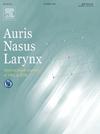Identifying predictors of persistent post-earthquake dizziness among adolescents after the 2023 earthquakes in Türkiye: A cross-sectional, multicenter study
IF 1.6
4区 医学
Q2 OTORHINOLARYNGOLOGY
引用次数: 0
Abstract
Objective
The impacts of earthquakes on the mental health of individuals have been well-documented. Additionally, individuals frequently report experiencing dizziness akin to seasickness or carsickness. This phenomenon, termed “post-earthquake dizziness syndrome” (PEDS), has garnered increasing attention due to its unclear etiology. This study investigates the prevalence and predictors of ongoing PEDS within an adolescent population more than one year after the 2023 Kahramanmaraş earthquakes.
Methods
This cross-sectional study was conducted between April 2024 and June 2024 across five cities officially designated as an “earthquake zone” by relevant authorities. The sample comprised 551 adolescents aged 11 to 18 years who were recruited from child psychiatry outpatient clinics within these cities.
Results
402 participants (73.0 %) reported experiencing PEDS following the earthquake, while 105 (19.1 %) reported ongoing PEDS. Multivariate logistic regression analysis revealed that higher trait anxiety and post-traumatic stress disorder (PTSD) symptoms, as well as being located on a higher floor during the earthquake, were positively correlated with the persistence of PEDS symptoms.
Conclusions
The findings underscore the potential association between PEDS and psychiatric disorders, such as anxiety and PTSD. However, the underlying mechanisms of PEDS remain elusive, requiring further research to elucidate the links between PEDS and psychiatric conditions for more effective treatment strategies.
确定 2023 年土耳其地震后青少年持续震后头晕的预测因素:一项横断面多中心研究。
目的:地震对人的心理健康的影响已有详细记载。此外,人们还经常报告说出现了类似晕船或晕车的头晕症状。这种现象被称为 "震后头晕综合症"(PEDS),由于其病因不明确,已引起越来越多的关注。本研究调查了 2023 年卡赫拉曼马拉什地震发生一年多后青少年群体中持续性 PEDS 的发生率和预测因素:这项横断面研究于 2024 年 4 月至 2024 年 6 月期间在五个被相关部门正式指定为 "地震带 "的城市进行。样本包括 551 名 11 至 18 岁的青少年,他们都是从这些城市的儿童精神科门诊中招募的:402名参与者(73.0%)报告在地震后经历了PEDS,105名参与者(19.1%)报告正在经历PEDS。多变量逻辑回归分析表明,较高的特质焦虑和创伤后应激障碍(PTSD)症状以及地震时所处楼层较高与 PEDS 症状的持续存在呈正相关:研究结果强调了 PEDS 与焦虑症和创伤后应激障碍等精神疾病之间的潜在联系。然而,PEDS 的潜在机制仍然难以捉摸,需要进一步研究以阐明 PEDS 与精神疾病之间的联系,从而制定更有效的治疗策略。
本文章由计算机程序翻译,如有差异,请以英文原文为准。
求助全文
约1分钟内获得全文
求助全文
来源期刊

Auris Nasus Larynx
医学-耳鼻喉科学
CiteScore
3.40
自引率
5.90%
发文量
169
审稿时长
30 days
期刊介绍:
The international journal Auris Nasus Larynx provides the opportunity for rapid, carefully reviewed publications concerning the fundamental and clinical aspects of otorhinolaryngology and related fields. This includes otology, neurotology, bronchoesophagology, laryngology, rhinology, allergology, head and neck medicine and oncologic surgery, maxillofacial and plastic surgery, audiology, speech science.
Original papers, short communications and original case reports can be submitted. Reviews on recent developments are invited regularly and Letters to the Editor commenting on papers or any aspect of Auris Nasus Larynx are welcomed.
Founded in 1973 and previously published by the Society for Promotion of International Otorhinolaryngology, the journal is now the official English-language journal of the Oto-Rhino-Laryngological Society of Japan, Inc. The aim of its new international Editorial Board is to make Auris Nasus Larynx an international forum for high quality research and clinical sciences.
 求助内容:
求助内容: 应助结果提醒方式:
应助结果提醒方式:


